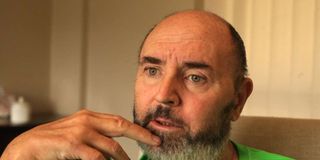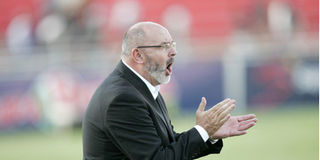Bobby Williamson: Scotsman who found love, passion in Africa

Former Harambee Stars coach Bobby Williamson during an interview with Nation Sport at his residence in Nairobi on August 16, 2020.
What you need to know:
- Williamson who has also coached at Plymouth and Chester City between 2004 and 2008 believes he is not done, yet.
- Williamson was born on August 13, 1961 and grew up in Glasgow, where he says life was hard.
Robert “Bobby” Williamson's 12-year stint in Africa has seen him experience first-hand challenges he says have bogged down the development of football on the continent.
It is a journey the former Uganda and Kenya coach admits took him from the comfort of his home in Glasgow and straight “into another world”.

Harambee Stars head coach Bobby Williamson issues instructions to his players during their Africa Nations Championships (Chan) second leg of their first round qualifying match against Ethiopia on July 4, 2015 at the Nyayo National Stadium.
With a plastered left arm on a sling, the 59-year referred to as “Bobby” in local football circles, recently invited Nation Sport to his home in Lavington, an upmarket suburb in Nairobi, and with a deep Scottish accent, shared his football journey thus far.
Williamson, who won the Scottish Cup with Kilmarnock in 1996 as a coach, speaks of his joy and satisfaction working with what he describes as “some of the best talents” in the continent, including Harambee Stars captain Victor Wanyama, forward Michael Olunga, and Ugandan goalkeeper Denis Onyango.
He further narrates the culture shock of living and working in Africa as a native Scot.
He further opens up on some horror tales of betrayal and back-stabbing from football administrators he put too much trust in.
He highlights the “normal” challenges, namely delayed payments and court battles, plus an infamous head-to-head tussle with a big-name footballer who walked out on President Yoweri Museveni at a State function.
His is also a story of finding true love and battling cancer.
“It (cancer) caused me problems breathing. I had colonoscopy and endoscopy. It was unbearable. I went to India and the tumour was removed but I had to have chemotherapy once a week and 20 sessions of radiotherapy which was tough.”

Harambee Stars coach Bobby Williamson barks instructions from the touchline during their World Cup qualifier against Cape Verde on November 13, 2015 at the Nyayo National Stadium.
He also suffered from chronic mouth ulcers and was diagnosed with diabetes.
Sleeping giant
After losing his job as Uganda Cranes coach, Williamson, a prolific forward in his heyday, landed in Kenya in 2013 as Gor Mahia coach and promptly guided them to a first league title in 15 years.

Former Harambee Stars coach Bobby Williamson during an interview with Nation Sport at his residence in Nairobi on August 16, 2020.
“I settled for far less than I was earning in Uganda. I had met this amazing Kenyan woman in Uganda who had a good job. She was relocating to Kenya and it provided the opportunity to come over to Nairobi. With the job at Gor, I found an opportunity to manage a sleeping giant, and wake it up,” he says.
But then, there were the all too familiar challenges.
“The club sponsor left, and we suffered cash flow problems. My players could barely survive. The landlord would knock on my door and demand rent and I had no money. I left the club without receiving my bonuses for winning the league."

National Under-23 head coach Bobby Williamson (left) consults with Team Manager Simeon Mulama during training session at Kasarani ahead of their Rio Olympics qualifier against Botswana on April 21, 2015.
The opportunity to coach Harambee Stars would come calling in 2014, amid a cloud of controversy.
“I was approached by then Kenya Football Federation president Sam Nyamweya. I spoke to the club chairman (Ambrose Rachier) and he was very supportive and allowed me to join the national team. I negotiated for the job under the impression my predecessor (Adel Amrouche) had been suspended by Caf for a year as reported in the papers. When I met him (Amrouche) a week after signing, he asked me 'why have you taken my job?' I was surprised.

Former Harambee Stars coach Bobby Williamson during an interview with Nation Sport at his residence in Nairobi on August 16, 2020.
“We had an opportunity to do something good with Kenya but the working environment was not conducive,” he says.
“I went for a year without pay. Sometimes I was issued with cheques that bounced. In 2015, we travelled for 21 hours to Cape Verde for a crucial game in a propeller-powered plane on a journey that should otherwise take six hours. We were all scared stiff. My players had not eaten for almost a day.
We lost that match 2-0 despite beating the same team 1-0 at home.”
"A new management came in (led by current FKF president Nick Mwendwa) and I was sacked without reason. I had no choice other than to go down the legal route,” says Williamson, who would eventually be awarded Sh58 million in damages by the Employment and Labour court for unlawful dismissal.
“I am still waiting for that money. I really hope someone will obey the law. Kenyan football has the potential to produce a team to play consistently at the World Cup. All that is needed is a huge chunk of professionalism to be instilled.”
Recruitment centre
Williamson's African journey began in 2008, when he applied for the Uganda Cranes job, only to reject it when it was formally offered, and then change his mind and take it, all in 21 days.
"I’d just left (coaching English side Chester) and was waiting for the next chance. An agent told me there could be an opening in Uganda after (Romanian coach) Laslo Csaba quit to join (Scottish side) Hearts. An interview was organised in London with my employer. I didn't know much about Uganda. So I told him 'if I am to coach Uganda wouldn't it be better if I did the interview in Kampala?’
“We arrived in Kampala a few days later and I was handed the job. I insisted on having a look at the training grounds before signing the contract.
A driver came to pick me from the hotel at 6pm and drove me to the main stadium (Namboole).

Former Harambee Stars coach Bobby Williamson during an interview with Nation Sport at his residence in Nairobi on August 16, 2020.
The night was creeping in and (at the time) there were no street lights, people had lit bonfires at the side of the road, probably to provide lighting. At the stadiums, there were several policemen sleeping on the tarmac, terraces and even on the pitch without mattresses.
The driver informed me of a recruitment drive involving the police. So the stadium acts as a recruitment centre, training ground, and match venue. I thought about it and decided not to take the job."
He narrates further: “I informed my agent who informed the federation I had turned down the job. The following evening we drove to the airport in Entebbe to catch a flight back to the UK but for some reason we couldn't board. I think the flight was full. So we settled in at a hotel in Entebbe to wait for the next available flight.”
“That night, I switched on TV and watched a replay of a Ugandan league match. I was amazed by how the players were talented, controlling a football on bumpy pitches as passionate crowds cheered them on. In the morning. I took a walk at the (Lake Victoria) beach outside my hotel and saw a very beautiful country, scenery, weather, the people, everything was amazing. It was like I was in another world. I changed my mind and decided to stay. Thankfully, the management again agreed to hand me the job.
Infamous bust-up
What followed was a successful stint at the helm of the Uganda Cranes. His tour of duty comprises four Council of East and Central Africa (Cecafa) Senior Challenge Cup titles, and qualification to the 2014 Africa Cup of Nations Championship (Chan) tournament.
It was the first time in more than two decades Uganda would grace a continental competition.
But again, there were failures in between, including failing to qualify for the Africa Cup of Nations in three attempts.
There was also the infamous bust-up with David Obua, arguably Ugandan star player of the time, in 2011.
He also cites working with administrators who doubled up as player agents, and in his own words, back-stabbing by his eventual successor Milutin “Micho” Sredojevic as the low moments.

Former Harambee Stars coach Bobby Williamson during an interview with Nation Sport at his residence in Nairobi on August 16, 2020.
“Obua walked out on President Museveni who'd come to camp to visit the team before a crucial game. I agreed with (then) Uganda FA President (Lawrence Mulindwa) that he had to be punished.
I removed him from the squad. He was not going to play anyway as he’d not trained all week. He was not getting too much play-time at his club. He was unfit."
The lanky forward never played for Uganda again.
"My job was made more difficult when officials at the federation tried to unsettle and sell players before a major tournament (the 2014 Africa Nations Championship) behind my back. One particular official worked to bring in my successor behind my back. At times, players would go partying before matches and the media appeared to know and protect them."
Williamson was born on August 13, 1961 and grew up in Glasgow, where he says life was hard.
His parents did casual jobs to educate him and his younger sister who is currently in a cleaning business in Scotland.
“I honed my football skills with the school team and got a breakthrough at 14. I also worked at a building site as a labourer. Life was tough. I wasn't keen on being a builder. The industry is tough and demanding. I worked from 6am to 10pm and found little time to train in between."
"I got my first contract at Clyde Bank, and then moved to Rangers at 22 after the club paid 100,000 (about Sh14.8 million at current exchange rates) as transfer fees. My mother was surprised to see me in the papers when I signed my first professional contract. My parents supported me but didn’t know much about football.”
“I found it strange to play football every day, but still enjoyed it. You cannot compare building a house to playing football. You need to prepare your muscles differently.
Then the worst happened. "I broke my leg during pre-season and was off the pitch for a year. My greatest memory at Rangers was scoring a winner against Celtic. At the end of the season (Scottish legend) Graeme Souness came in as coach and brought with him several players from England, including the great Trevor Francis. I was shipped off to West Brom in England."
“I Joined West Brom at 25. I wasn't successful on the pitch at West Brom but enjoyed my time over there. I scored 20 goals for the reserves but in all honesty failed to establish myself.
Further stints as a player followed at Rotheram (1988-1990) in the fourth tier before he returned to Kilmarnock for his most successful stint as a player and coach.
“I scored 33 goals in my first season and helped the team gain promotion. Then went to coaching because I didn’t want to go back to building after retiring as a player.”
Williamson who has also coached at Plymouth and Chester City between 2004 and 2008 believes he is not done, yet.
“I have not received offers, yet. But I never say never. I enjoy Nairobi, my family is here. Football is my life.”





